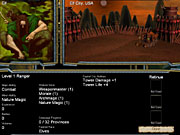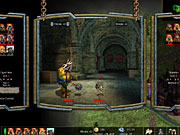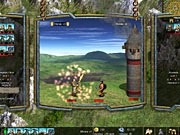The long-running Warlords series was one of the first lines of computer strategy games to integrate colorful high-fantasy and role-playing elements with the traditional turn-based strategy you'd normally associate with a wargame or a board game. The series went on to inspire other such games, like Heroes of Might and Magic, Master of Magic, and Age of Wonders. Like these games, the fourth Warlords game, Heroes of Etheria, lets you conquer a vast fantasy world by exploring it with adventuresome parties that consist of stalwart hero characters and fantastical creatures who become more powerful by gaining experience levels from battling enemy parties and neutral monsters. However, the new game does away with concerns like city development and alliances, and introduces a brand-new combat system that's reminiscent of a collectible card game. As a result, Warlords IV is a highly streamlined sequel that shifts the series' focus away from management and diplomacy to surprisingly fast-paced combat.

Like SSG's recent Warlords Battlecry real-time strategy series, Warlords IV lets you create a customizable, persistent warlord that you can carry over from game to game, keeping experience levels and skills intact. Your objective is to raise armies to take over each of the game's maps by defeating your enemies' armies, capturing or razing their cities, and increasing your own holdings by clearing out monster-ridden neutral structures, researching magic spells, and acquiring powerful artifacts for your hero characters.
Unlike other, similar games, Warlords IV keeps management elements to a bare minimum. For instance, there are only two resources in the game: mana and gold. Mana is used to power spells and is generated by heroes and a few artifacts, while gold is generated regularly by towns and is used solely for maintaining your armies, hiring the occasional hero, and/or making an overall upgrade to your town. Recruiting new armies doesn't cost you any resources. You simply need to wait a certain number of turns for your units to be generated. Warlords IV has no specific add-ons that can be built in your town by default (though you can add a single building between missions). In addition, Warlords IV has no diplomacy or trading elements, so every other town and army on the map that isn't already controlled by you is flagged as an enemy.
These apparent omissions seem like they were made to present Warlords IV in a more straightforward, and perhaps more shallow, manner than other games of this sort. However, they do keep the pacing of the game brisk, which is especially true toward the end of a mission, when your many captured keeps require little to no baby-sitting. In the meantime, you're free to focus on building up armies and conquering the map. Since captured towns are your main source of gold, you'll want to expand more quickly than your opponents to control a greater cash flow, thereby sustaining a larger army. Neutral ruins often house artifacts, caches of gold, and powerful mercenaries for hire that you'll want to obtain before your opponents can--particularly in single-player games against Warlords IV's challenging AI opponents.

Since Warlords IV has no diplomacy, there's only one language your enemies will understand. To this end, you can create armies, or "stacks," of up to eight units, including multiple hero units with various special abilities, including the ability to carry artifacts. There are 10 different fantasy factions in the game, each with different unit types, strengths, and weaknesses. Compiling an army that belongs to the same faction allows for a morale bonus in battle, as well as various miscellaneous bonuses. In addition, conquering a city that belongs to your faction, or to a faction of similar alignment, lets you recruit units of that same faction. While conquering a city that belongs to a faction of opposing alignment won't let you recruit any of that opposing faction's units.
Despite this lack of availability, you may still be tempted to assemble a motley "killer stack" consisting of high-level creatures from differing factions. Doing so will cost you an exceptional amount of gold for maintenance, and it will also cause a severe morale hit (though low morale can be compensated for in a few different ways, like having a hero with leadership skill, for instance). Since all units, from heroes to the lowliest level-one units, gain experience levels, you'll often be best-served by having a full stack of eight. You'll want to preserve it for as long as possible so that its troops can survive to gain levels. Experience is gained through fighting, which can be auto-resolved, as in previous Warlords games, but battles are now much more interesting using Warlords IV's new combat system.

When two armies clash in Warlords IV, the game pits individual units against one another until one dies. The controller of the dead creature then gets to choose the next soldier to step into the fray, though between these skirmishes, archer units and defense towers can unleash arrow attacks, and siege units can attack defending towers to knock them down (and cause them to stop firing arrows). While the system may seem like a simplistic slugfest, at first, it's actually surprisingly strategic, since your units' special abilities and your magic spells can affect the outcome of a battle significantly. For instance, certain evil units have an ability, called "terror," which not only decreases an enemy's effectiveness in battle, but it can also "frighten" an enemy out of battle, forcing the opposing player to choose a different unit to fight instead.
All units have four special abilities. They also have skills that are generally useful, like regeneration, armor, and warding. Some units feature highly specialized skills, like manslayer and smite evil. Even though your actions in battle are largely limited to choosing the order in which your soldiers will fight for you, battles are deceptively deep--though fast-paced. Your units' various special abilities, and the fact that the last surviving unit receives bonus experience toward gaining a level, make combat quite nontraditional in Warlords IV.
While Warlords IV boldly eliminates many fantasy strategy conventions, its production values probably could have used a boost. Though the game includes colorful 2D graphics, Warlords IV's visual presentation is inconsistent. One moment you're looking at large and fairly detailed portraits of your warlord (some of which were recycled from SSG's Warlords Battlecry games); the next minute you're looking at your miniscule stack on a sparse-looking overland map. Then you're looking at small 2D portraits of your units at the nearest town. After that you're watching battles between poorly animated, rendered sprites that take jerky-looking swings at one another. The game's sound effects aren't impressive either. Fighting monsters grunt and squeal, while humanoid units cry out goofy-sounding taunts that might have been more amusing if they weren't so muffled. The game's synth-orchestral music, at least, is appropriate for its setting and is unobtrusive enough to ignore.

Its presentation aside, Warlords IV offers a comprehensive single-player campaign, 28 one-off skirmish missions, and a host of multiplayer options, including online play, direct IP connect, play-by-e-mail, and hotseat play on the same computer. The game also includes a map editor that lets you create your own missions, as well as a random map generator, so you probably won't run out of things to do with Warlords IV for some time. While Warlords IV does streamline out a great deal of interesting strategic elements you might expect from a game of this sort, what it leaves behind is still engaging enough to keep fans of fantasy strategy playing.